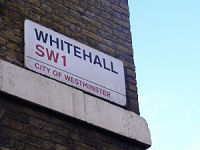23 February 2009
Local residents will have the power to instigate local referendums, will know more about how town hall money is spent and Reading Borough Council will have more powers and funding under a new Conservative blueprint for local democracy.
The proposals were recently unveiled by David Cameron in a major policy document, and have been endorsed this week by Reading East MP, Rob Wilson, and Reading West Parliamentary Candidate, Alok Sharma. The new policies include:
Commenting on the new proposals, Rob Wilson said, “I welcome these plans to put local people in the driving seat, and cut back interference and meddling from Whitehall bureaucrats.
“The next election won’t just be about whether to transfer power from Labour to Conservatives. It will also be about whether to transfer power from the central state to local people.
“Greater powers for local government must also be accompanied by more openness, greater accountability and new measures to protect the pockets of local taxpayers.”
Alok Sharma added his support to the proposals, and said, “These proposals present a real opportunity to hand decision making about local issues back to local people. Too often people feel that their voices are drowned out by central government and unelected bureaucrats and I hope these proposals will help to re-engage local people in local democracy when they see that they will be able to make a real difference to addressing important local issues within the community."
The proposals were recently unveiled by David Cameron in a major policy document, and have been endorsed this week by Reading East MP, Rob Wilson, and Reading West Parliamentary Candidate, Alok Sharma. The new policies include:
- Abolishing all regional planning and housing powers exercised by regional government, returning powers and discretion back to local communities.
- Creating bottom-up incentives for house building, by allowing Reading Borough Council to benefit from the increase in Council Tax revenues from new homes.
- Allowing councils to establish their own local enterprise partnerships to take over the economic development functions and funding of the South East England Development Agency (SEEDA).
- Giving a real incentive for councils to promote local economic growth, by allowing them to keep the uplift in business rate revenues from businesses growing in size.
- Granting Reading Borough Council a new discretionary power to levy business rate discounts, allowing them to help local shops and services, such as rural pubs or post offices, or even create new local enterprise zones.
- Making greater use of direct democracy, including allowing Reading’s residents to veto high Council Tax rises, or instigating a council-wide referendum on local issues if called for by a petition signed by 5% of local residents.
- Requiring Reading Borough Council to publish detailed information online on expenditure by local councils – including the pay and perks of senior staff; and issuing new guidance to stop ‘rewards for failure’ to sacked town hall staff (as highlighted by the recent Baby P scandal).
- Scrapping Labour’s new Infrastructure Planning Commission, which it intends to use to force through the environmentally damaging Heathrow expansion and other controversial projects; and instead use National Policy Statements, ratified by Parliament, to help speed up planning inquiries.
Commenting on the new proposals, Rob Wilson said, “I welcome these plans to put local people in the driving seat, and cut back interference and meddling from Whitehall bureaucrats.
“The next election won’t just be about whether to transfer power from Labour to Conservatives. It will also be about whether to transfer power from the central state to local people.
“Greater powers for local government must also be accompanied by more openness, greater accountability and new measures to protect the pockets of local taxpayers.”
Alok Sharma added his support to the proposals, and said, “These proposals present a real opportunity to hand decision making about local issues back to local people. Too often people feel that their voices are drowned out by central government and unelected bureaucrats and I hope these proposals will help to re-engage local people in local democracy when they see that they will be able to make a real difference to addressing important local issues within the community."

